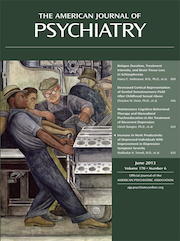Maintenance Cognitive-Behavioral Therapy and Manualized Psychoeducation in the Treatment of Recurrent Depression: A Multicenter Prospective Randomized Controlled Trial
Abstract
Objective
This multicenter study compared the relapse and recurrence outcomes of two active treatments, maintenance cognitive-behavioral therapy (CBT) and manualized psychoeducation, both in addition to treatment as usual, in patients in remission from depression.
Method
This was a multicenter prospective randomized observer-blinded study with two parallel groups. The authors assessed 180 patients with three or more previous major depressive episodes who met remission criteria over a 2-month baseline period and who were randomly assigned to 16 sessions of either maintenance CBT or manualized psychoeducation over 8 months and then followed up for 12 months. The main outcome measure was time to first relapse or recurrence of a major depression, based on DSM-IV criteria, as assessed by blinded observers with the Longitudinal Interval Follow-Up Evaluation.
Results
Cox regression analysis showed that time to relapse or recurrence of major depression did not differ significantly between treatment conditions, but a significant interaction was observed between treatment condition and number of previous episodes (<5 or ≥5). Within the subsample of patients with five or more previous episodes, maintenance CBT was significantly superior to manualized psychoeducation, whereas for patients with fewer than five previous episodes, no significant treatment differences were observed in time to relapse or recurrence.
Conclusions
The results indicate that maintenance CBT has significant effects on the prevention of relapse or recurrence only in patients with a high risk of depression recurrence. For patients with a moderate risk of recurrence, nonspecific effects and structured patient education may be equally effective.



